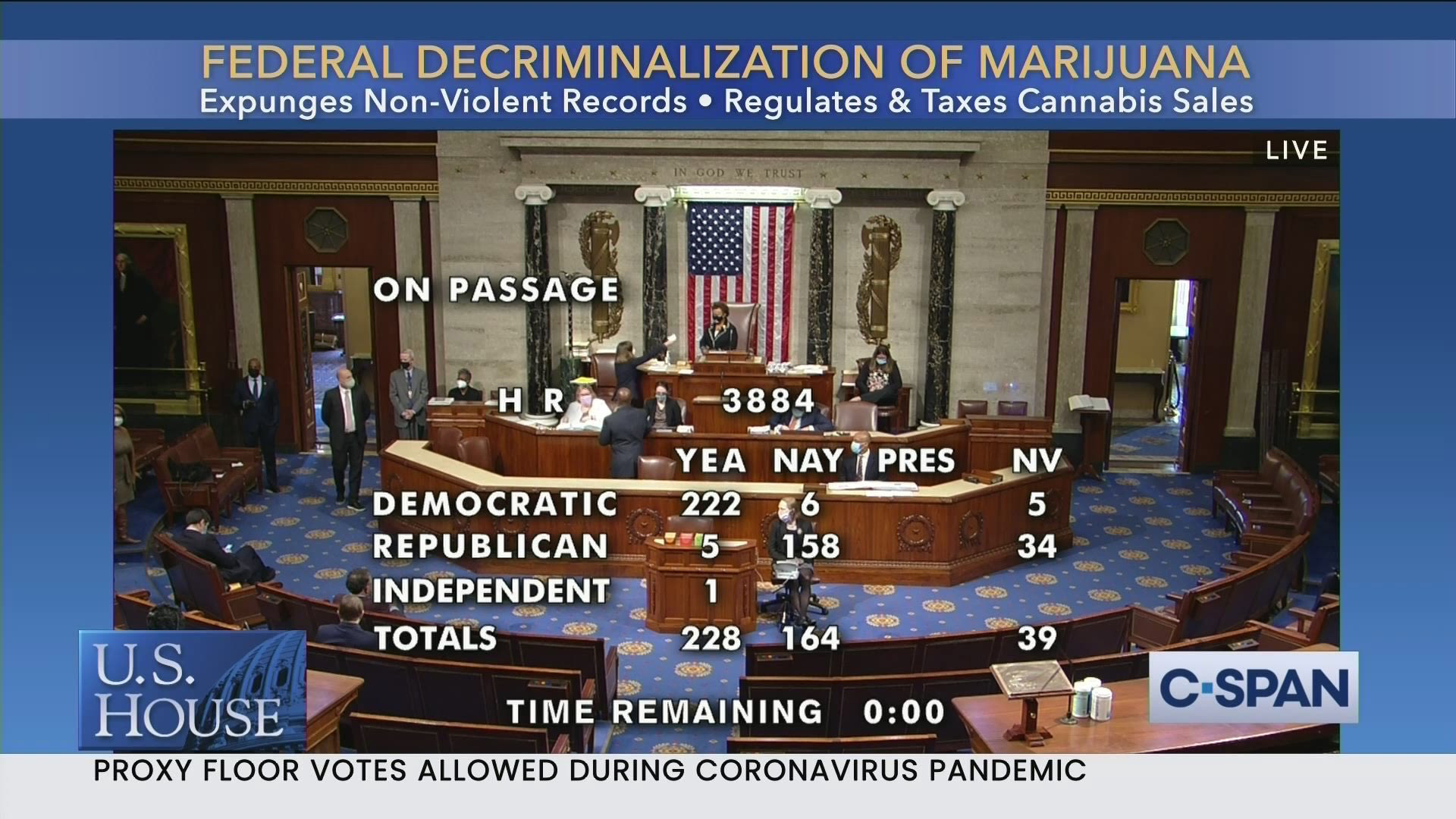The U.S. House of Representatives made history early Friday afternoon when it approved the MORE Act. The bill, as written, would essentially end federal marijuana prohibition.
The MORE Act (Marijuana Opportunity Reinvestment and Expungement Act) survived the House with a vote of 228-164. The bill will now advance to the senate where it is expected to face a much tougher crowd.
"The bill is passed."
U.S. House APPROVES #MOREAct legislation on Federal Decriminalization of #Marijuana, 228-164.
Goes now to the U.S. Senate. pic.twitter.com/qSngBuJr3I
— CSPAN (@cspan) December 4, 2020
Senate Majority Leader Mitch McConnell (R-KY), has signaled that he may not make it easy for the bill despite having insinuated in the past that he might be open to a change in marijuana laws. Above all, he has taken issue with Democrats plan to include diversity studies as part of the reform bill. He argues that now is the time to focus on the COVID-19 pandemic.
According to the bill’s text, passage would mean the following changes to current law:
- replaces statutory references to marijuana and marihuana with cannabis,
- requires the Bureau of Labor Statistics to regularly publish demographic data on cannabis business owners and employees,
- establishes a trust fund to support various programs and services for individuals and businesses in communities impacted by the war on drugs,
- imposes a 5% tax on cannabis products and requires revenues to be deposited into the trust fund,
- makes Small Business Administration loans and services available to entities that are cannabis-related legitimate businesses or service providers,
- prohibits the denial of federal public benefits to a person on the basis of certain cannabis-related conduct or convictions,
- prohibits the denial of benefits and protections under immigration laws on the basis of a cannabis-related event (e.g., conduct or a conviction),
- establishes a process to expunge convictions and conduct sentencing review hearings related to federal cannabis offenses, and
- directs the Government Accountability Office to study the societal impact of cannabis legalization.
Congressman Ted Lieu (D-33) of California, was quick to react publicly to the bill’s passage.
“Spending even a dime of taxpayer’s money to investigate, prosecute and jail people for consuming a product that is less dangerous than alcohol is stupid and a waste of federal dollars,” Lieu said on Twitter Friday afternoon. “Pleased to have coauthored the #MOREAct in the Judiciary Committee and pleased it passed today.”
Spending even a dime of taxpayer’s money to investigate, prosecute and jail people for consuming a product that is less dangerous than alcohol is stupid and a waste of federal dollars. Pleased to have coauthored the #MOREAct in the Judiciary Committee and pleased it passed today. https://t.co/jd0Z6a76pt
— Ted Lieu (@tedlieu) December 4, 2020
Another interesting take on the passage came from Congresswoman Chellie Pingree (D-1) of Maine. She feels that the pandemic is why passage of the MORE Act is more crucial now than ever before.
“Passage of the #MOREAct comes at a critical moment, as our state faces a significant revenue shortfall caused by the pandemic,” the Congresswoman said. “Meanwhile Maine’s recreational marijuana market yielded $1.4 million in sales in its first month, offering much-needed tax revenues to our state.”
Passage of the #MOREAct comes at a critical moment, as our state faces a significant revenue shortfall caused by the pandemic. Meanwhile Maine’s recreational marijuana market yielded $1.4 million in sales in its first month, offering much-needed tax revenues to our state. https://t.co/McgopZOxeF
— Congresswoman Chellie Pingree 🇺🇸 🇺🇦 (@chelliepingree) December 4, 2020
The window is increasingly tight for this bill to make it through the Senate, with Congress expected to adjourn for the year on Thursday, Dec. 10, 2020. That leaves little time to act, and makes it that much easier to block.
In all likelihood, the bill will have to be brought back in 2021. It’s a common practice for bills to take multiple, in some cases, many, sessions before they see the light of day. With the balance of the Senate still in flux for the coming year, it’s tough to predict what the near future will hold for the MORE Act.
Cannabis & Tech Today will be following this story closely in the coming days, so check back regularly.






